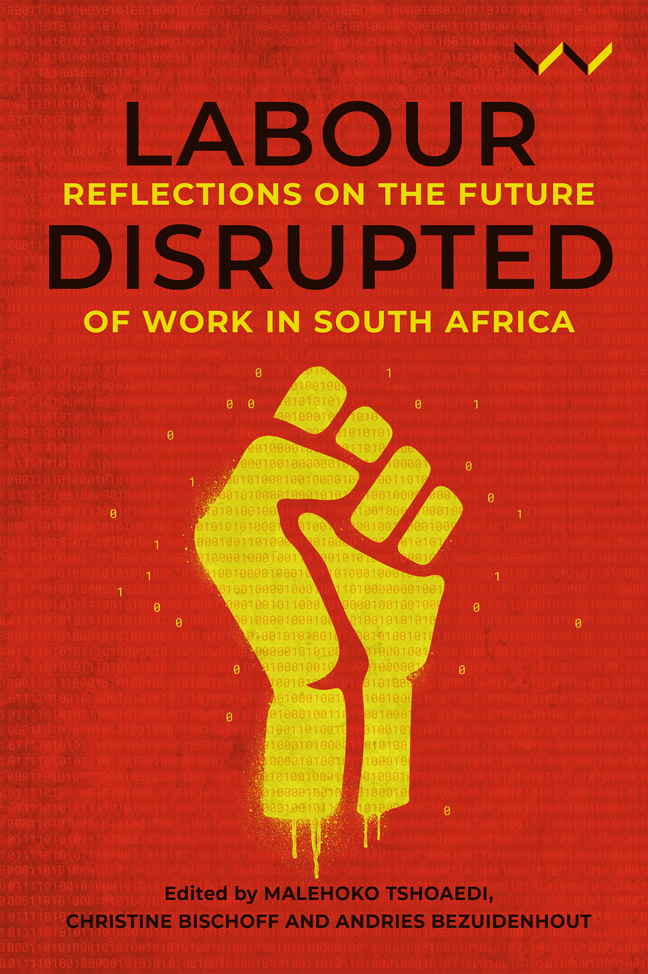Book contents
- Frontmatter
- Contents
- Figures and Tables
- Acknowledgement
- Acronyms
- Introduction: Disruptions and New Directions in South African Labour Studies
- Chapter 1 Fragmented Labour Movement, Fragmented Labour Studies: New Directions for Research and Theory
- PART I Changing Solidarities
- PART II Technology and Work
- PART III New Forms of Organising
- PART IV Labour and Lockdown
- Conclusion: Questions, Answers and New Directions
- Contributors
- Index
Chapter 7 - Trade Union Responses to Production Technologies in the Fourth Industrial Revolution
Published online by Cambridge University Press: 01 March 2024
- Frontmatter
- Contents
- Figures and Tables
- Acknowledgement
- Acronyms
- Introduction: Disruptions and New Directions in South African Labour Studies
- Chapter 1 Fragmented Labour Movement, Fragmented Labour Studies: New Directions for Research and Theory
- PART I Changing Solidarities
- PART II Technology and Work
- PART III New Forms of Organising
- PART IV Labour and Lockdown
- Conclusion: Questions, Answers and New Directions
- Contributors
- Index
Summary
INTRODUCTION
There has been a proliferation of discussions and debates about the future of work in the context of what is now popularly known as the Fourth Industrial Revolution (4IR) (see Mashayamombe in this volume; Schwab 2015; Balliester and Elsheikhi 2018; Lee et al. 2019; Philbeck and Davis 2019). The industrial revolutions, as described by Klaus Schwab (2017), tend to be processes in modern history triggered by technological innovations that have a direct impact on work, the economy and human lives in general. The first industrial revolution, according to Xu Min, Jeanne David and Suk Hi Kim (2018), took place between 1760 and 1840, and was driven by steam locomotive power and mechanised textile manufacturing. The second industrial revolution, beginning at the end of the 1800s and continuing into the early 1900s, involved the discovery and use of electricity in the mass production of goods (Schwab 2015). Beginning in the 1960s, the third revolution was a build-up from the second one in the sense that it concerned the use of electronics, information technology and data to improve production and its automated processes (Xu, David and Kim 2018). The Fourth Industrial Revolution, which is the current phase, takes forward the third industrial revolution. Schwab (2015, 1) explains: ‘The fourth industrial revolution is fundamentally different from the previous revolutions as it is characterised by a range of new technologies that are fusing the physical, digital and biological worlds, impacting all disciplines, economies and industries.’
According to Hyeoun-Ae Park:
Technologies such as artificial intelligence, the Internet of Things (IoT), cloud computing, social media, data science, 3D printing, connected wearable devices, quantum computing, robotics, and genetics are the driving forces of this revolution. These transformative technologies will impact all disciplines, economies, businesses, societies, and individuals.
(Park 2016, 1)However, the whole notion of a Fourth Industrial Revolution is contested; there are scholars who argue convincingly that the current phase of technological advances normally associated with the 4IR are just an expansion of the third industrial revolution (Cooper 2011; Elia, Secundo and Passiante 2017).
This chapter builds on the perspective in John Mashayamombe's chapter, and asserts that technology plays a particular role in capitalist production – an aspect that tends to be ignored by those who support the notion of a Fourth Industrial Revolution.
- Type
- Chapter
- Information
- Labour DisruptedReflections on the Future of Work in South Africa, pp. 150 - 171Publisher: Wits University PressPrint publication year: 2023

